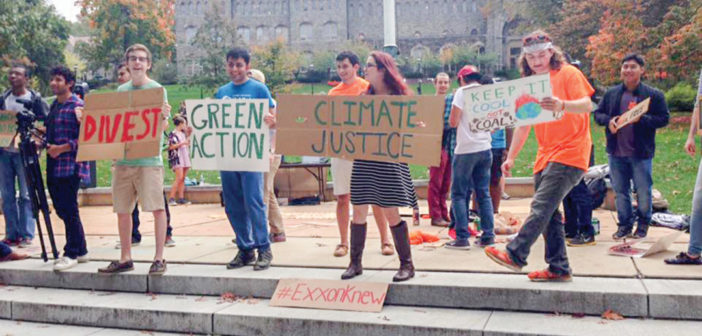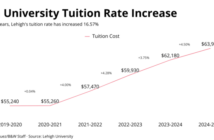Despite Lehigh’s recent sustainability initiatives, some students still feel as though Lehigh is not doing enough to reduce its fossil fuel usage.
The sentiment follows years after a movement and campus rally led by the Green Action Club on the UC front lawn in 2016 which demanded tighter university policies on ethical investments. The movement was sparked mainly by Lehigh’s investments in the fossil fuel and natural gas industries.
Samantha Roth, ’19, the president of the Green Action Club, spoke about the club’s limited interaction with the Board of Trustees after confronting them over Lehigh’s fossil fuel usage.
“The Board of Trustees met sometime in March 2018 to discuss divestment,” Roth said. “The official response we got was they could not divest because Lehigh does not control the investment firm that they hired. They can’t tell the investment firm what to invest in.”
Roth said she never spoke directly with the Board of Trustees.
“Pushing Lehigh to divest from fossil fuels was a dead end after last year,” she said. “The Green Action Club decided to take a break and reconvene later.”
Former Green Action President Andrew Goldman, ’19, also noted that nothing really changed following the rally in 2016. He said outside of coverage from The Brown and White, the administration never acknowledged the group’s requests unless they reached out to the administration, but never the other way around.
Goldman said as far as he knows, he is not aware of any changes that have occurred between 2016 and now in terms of the university’s investment policy despite student pressure.
Noor Baban, ’22, a resident of M&M’s outdoor adventure-themed floor, voiced her opinions regarding Lehigh’s inaction.
“I understand that Lehigh needs to utilize fossil fuels for certain programs such as the bus system, but for being such a prestigious school, I feel like we could create a greener campus and set ourselves as an example to other universities out there,” Baban said.
Baban said she does appreciate the work Lehigh has done with the hydration stations across campus and the overall green initiatives. However, she urged the Board of Trustees to take it a step further.
“I’d like for Lehigh to decrease and minimize their fossil fuel usage,” Baban said. “That would be ideal. We have the money. Why don’t we put it towards something green?”
In terms of making the campus greener, Roth encouraged students and outside donors to donate to the Green Fund through the Green Action Club. She said that donors can donate to Lehigh without having their money go toward fossil fuel usage.
Even though both current and former presidents of the Green Action Club are stepping back from this issue for now, both urge the student body to learn about the concept and get involved.
Roth encourages Lehigh to not allow corporations to influence their decisions. But Goldman struck a different tone.
“If the administration wants to watch civilization crash and burn, let them,” Goldman said. “It will be on their conscience, not mine.”
Both the President’s Office and the Investment’s Office referred The Brown and White to University Communications for comment, and no employee from the Office of Sustainability replied with comment after repeated request.






Comment policy
Comments posted to The Brown and White website are reviewed by a moderator before being approved. Incendiary speech or harassing language, including comments targeted at individuals, may be deemed unacceptable and not published. Spam and other soliciting will also be declined.
The Brown and White also reserves the right to not publish entirely anonymous comments.
5 Comments
We should ALL strive for a clean, pollution free environment. However, the US, alone, cannot save the world. Those who would use taxation and economic power to advance their cause will hurt poor and middle class families disproportionately. Think of the smoke free zones on airplanes years ago as an analog to the earth today. Those that smoked (China, India, etc) made the flight miserable for those that did not (USA) who sat in the “smoke free” zone.
Well — the rest of the world was actually making pretty good progress, and we declined to join, which is a serious problem as we’re one of the highest-consumption spots in the world.
If you talk with real economists and policymakers you’ll find that there are ways of crafting environmental policy that do not leave the burden on the shoulders of the poor, or disproportionately on the shoulders of the middle class.
As a middle-class person, incidentally, I’m quite happy to give up some current GHG-fuelled bliss, and even some $$, to help make sure we don’t cook the grandbabies.
Your note suggests, btw, that your thinking is pretty 20th-c on these issues. We’re nearly 20 years into the new century. It’s possible to catch up, and it’s important to do it. Not for yourself, but for everyone on the planet who’s younger than you.
US did more improvement in carbon emissions than virtually anyone signed up on the Paris Accord.
Trump was right to pull us out of that agreement designed to suck money from the US treasury!!
Good for the Trustees for not caving in to the left wing agenda. Let them try to figure out how to function without electricity & fossil fuels since wind & solar can only power less than 10 % of our countries fuel needs.
These people are out to lunch when it comes to reality. We finally achieve energy independence & we want to throw away that competitive advantage?
You’re an engineer. It’s partly your job to figure it out. The rest of your job is to work with the social realities and the experts there. If you can’t deal with the important problems, or work with people outside engineering in good faith, what good are you? No, don’t splutter at me about what you can’t do, I’m not interested. I’ve got graduate-student engineers working on similar issues right now, in tandem with soc scientists, local-govt administrators, and experts in biz, and they don’t pout around with half-baked stats and political fuggedaboutit tantrums. They just get to work.